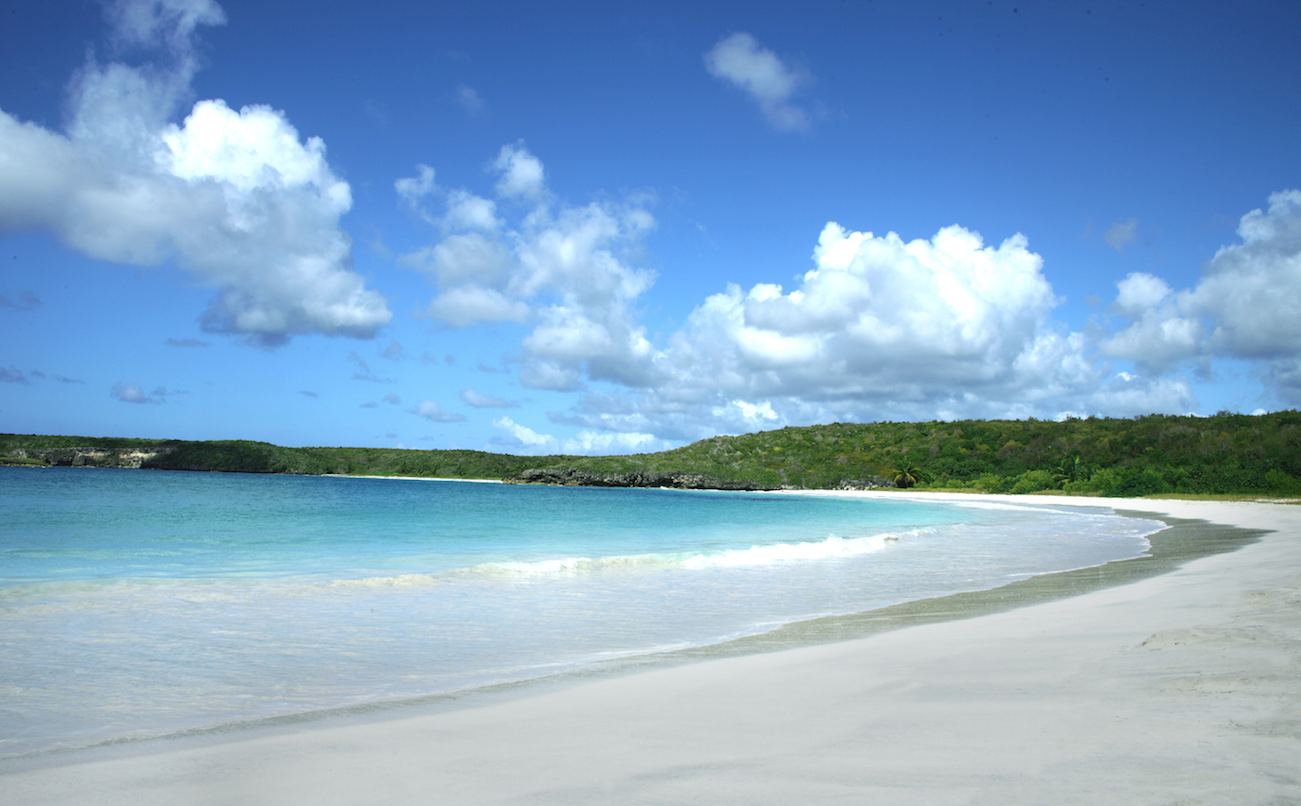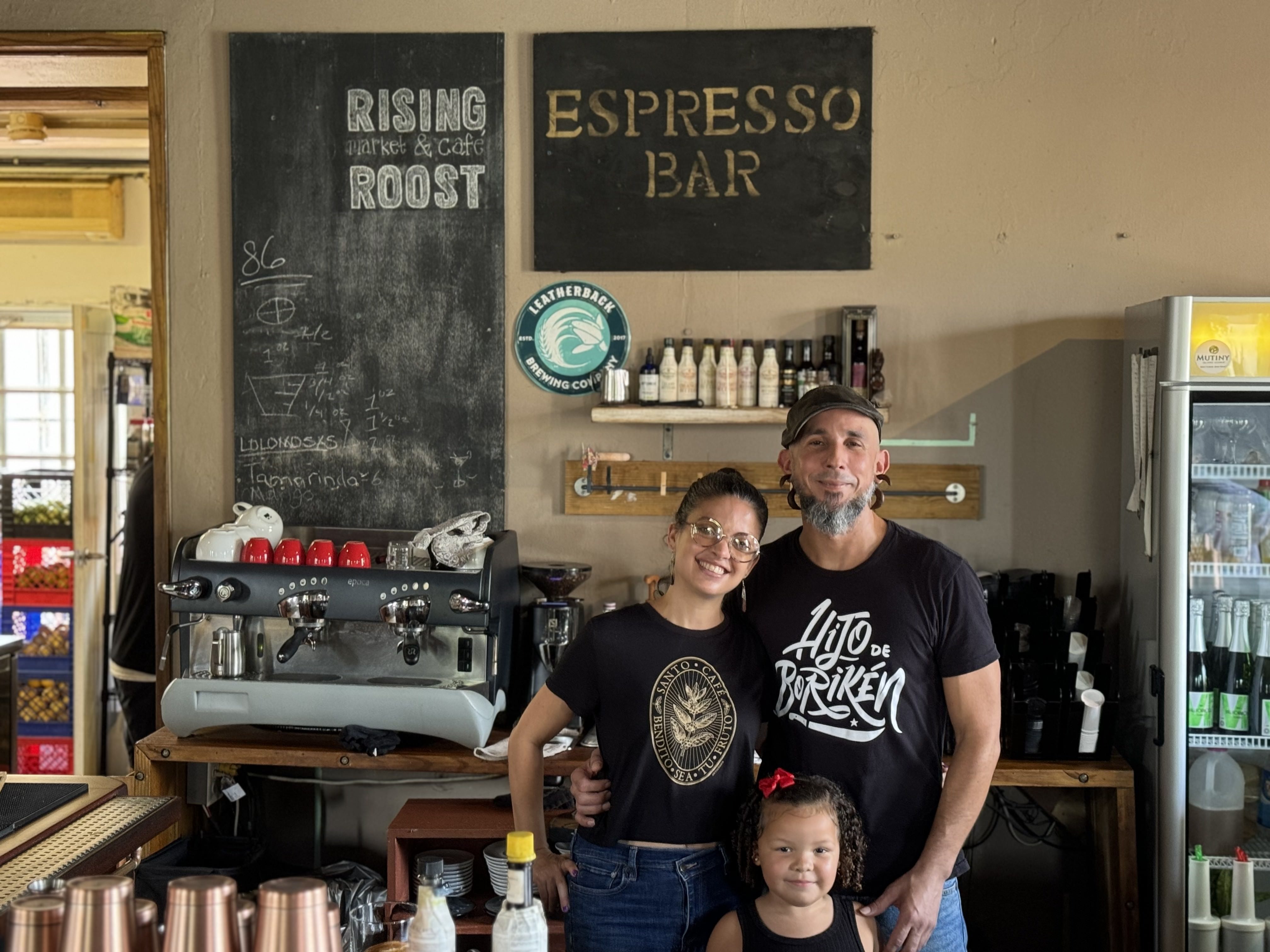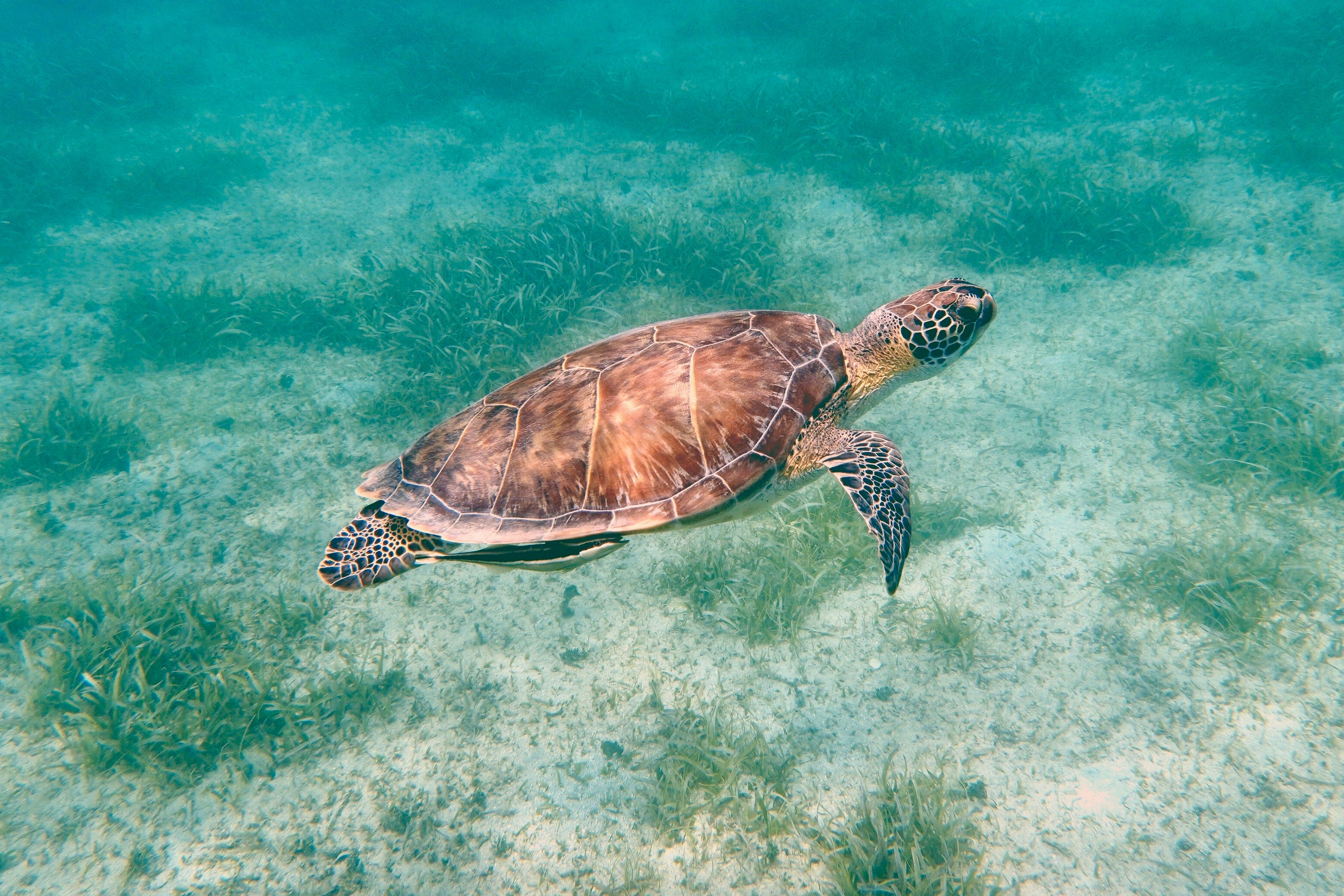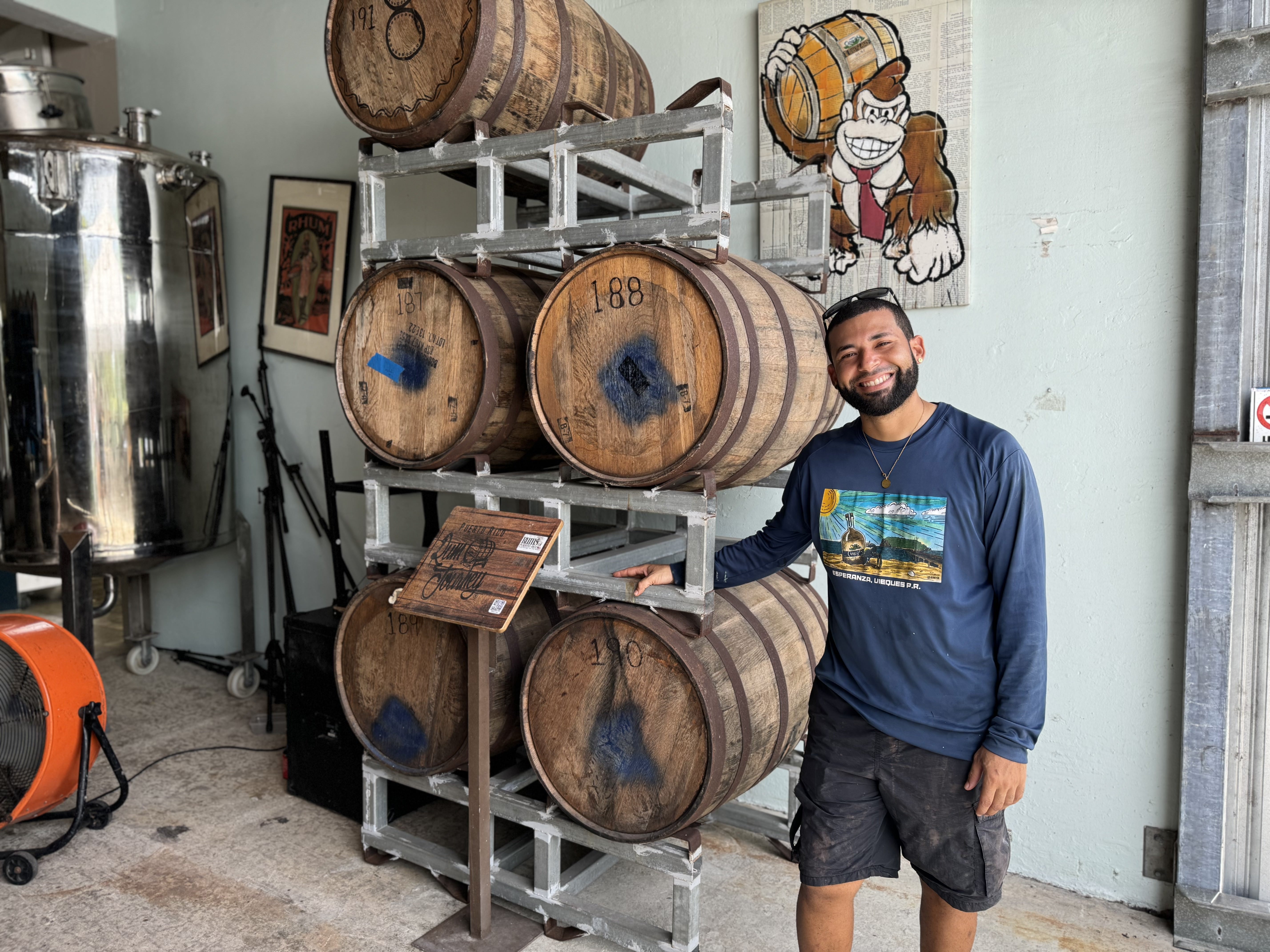Two hours after sundown we pushed our glass-bottomed kayaks out onto Mosquito Bay, a small inlet on the south coast of Puerto Rico’s remote island of Vieques, the surrounding mangrove trees silhouetted against the dark blue sky.
It was deathly silent as we paddled forward, following the voice of our guide and doing our best to keep our strokes in time as we headed for the centre of the bay. A sudden shriek pierced the silence from a neighbouring kayak. “It’s beneath you! Look down!”
The black water began to change, sparkling a glittering blue. A thick stream of diamonds whooshed under the boat as the current from the Caribbean Sea carried us forward.
We’d found the “magic” of Mosquito Bay’s bioluminescence. I dipped my hand in the warm water and the diamonds trickled down my arm like something from a trippy dreamscape. This type of plankton that glows as a defence mechanism when disturbed makes Vieques home to one of the brightest bioluminescent bays in the world – and I’m fortunate that I’m being shown it by the people who know it best: the island’s locals.
It’s one of several locally led experiences that show tourists a new way to explore the archipelago, away from Puerto Rico’s busy capital San Juan and the city’s popular historic old quarter, which while beautiful, contains only a taste of what this country has to offer.

Vieques lies about eight miles off the mainland and is reachable via ferry or charter plane, with the latter lasting only 10 minutes and giving you views of lush green trees tops and clear turquoise waters as you glide overhead.
It was baking hot by the time we touched down, and in dire need of coffee I was taken straight to Rising Roost, which as the name suggests, is the right place for a pick-me-up. Its owners Luz Yanira and Jose are from Puerto Rico’s central mountain region and took over the café in 2020. They serve up some of the best brew on the island and were poised at the espresso machine when we arrived. Hallelujah.
“Make sure you try some mavi,” said Luz Yanira. “It’s what all the locals drink here, we love it. It’s a slightly sweet, fermented juice made from bark.” I ordered a glass and sipped cautiously. It was sweet and refreshing, with that subtle fermented funk – a lot like the kombucha I’m used to back home.
Read more on island getaways:
The north of the island is known for its traditional food, so in addition to having American classics on the menu, Rising Roost serves up drinks such as mavi as well as Puerto Rician dishes like el bote veggie, which is a local bread called sobao that’s stuffed with scrambled eggs and vegetables, and topped with cheese.
Fuelled for the morning, we were given a brief history lesson by local resident Angie, who was born and raised on Vieques and runs a range of tours. She explained that like other parts of Puerto Rico, you can easily spot traces of the 400 years of former Spanish colonial rule. This includes Fortín Conde de Mirasol, the last Spanish fort built in the Americas (about a three-minute drive away from Rising Roost) and, more unusually, hundreds of free-roaming horses that still share the land with the island’s residents.
“Look now, you can see the baby with her mama,” Angie pointed to them in a clearing by the side of the road. The story goes they were introduced to the island by Spanish conquistadors and have since adapted to the local environment. “They’re very friendly,” Angie added.

Vieques has 15 beaches dotted around its 21-mile circumference, each with its own unique draw or requiring a little effort to reach (we’re talking bumpy car rides and woodland walks), but for those who persevere they can be idyllic pockets of tranquillity.
La Chiva Beach is the island’s most popular and accessible as you can drive right to the beachfront. Horses were quietly grazing in the shade when we pulled up and headed out for a swim in the clear turquoise waters.
Our second beach is known locally as Playa Negra due to its volcanic black sand. It is reached on foot down a path covered by a canopy of palm trees, where small crabs pop in and out the holes along its sandy verges.
Puerto Rico wears the dual hat of being a US territory and a Caribbean island. It’s also the self-proclaimed “rum capital in the world”. So, of course, a visit here would be remiss without a tasting. On to our next stop.
We’re shown big vats of deep honey coloured rum bubbling away in silver brewing tanks by Roberto, a member of the small four-person team working at Crab Island Rum, the island’s first artisan distillery, which opened in 2019.
“We [the team] are all from Vieques,” Roberto said. “I used to be a musician on the main island but after Hurricane Maria I came back to help, because everything was devastated and everyone was trying to help each other, of course.” He’s not the only person I spoke to who had returned to the island to help after Hurricane Maria reaped devastation in 2017. A category 5 hurricane, 2,975 of the 3,059 deaths were in Puerto Rico alone. It’s clear the region’s recovery was very much a shared one; its island communities rebuilt by those who call Puerto Rico home.

“Then I started here in 2021, trying a bit of everything,” Roberto added, referring to the different roles across the distillery from manning the gift shop and bar work (at their onsite bar), to learning the ropes as a rum producer. “We want to try and get people here who want to work and learn something different. We’re so small right now, but little by little, every year we’re trying to make something different to get a bit bigger.”
Our day ended at El Quenepo, an open-air restaurant run by husband-and-wife team Scott (chef) and Kate (host), who also run an adjoining hotel Puertas at El Quenepo, which gets its name from the beautifully restored doors fronting each of the rooms, taken from wood from the island.
“This building is kind of an amalgamation of Vieques’s history with a lot of nods to Puerto Rico in general but particularly Vieques because we’re a super independent community,” Kate explained as plates of crispy pakora prawns and spicy harissa arrived at the table, alongside a platter of local rabbit with spinach ravioli.
“We’re really an extended family here on Vieques. The island is all mom-and-pop businesses, we’re all small. So, you are supporting the person you’re seeing, you’re supporting each and every one of these people, it’s never a corporation owned by someone else.”

We stayed at El Blok, a hotel about a five-minute walk from El Quenepo down the main strip. Like other parts of Vieques, the street is lit up red at night so as not to disorientate the thriving leatherback turtle population on the island that you have a high chance of seeing when snorkelling – which we do the following morning.
“The seabed is covered with seagrass, which the turtles feed off when we’re out of jellyfish season,” said Sarah Elise, founder of eco-tourism group Crysal Clear, which among their tours run snorkelling sessions to catch a glimpse of the turtles and other marine life.
Crysal Clear was heavily involved in a coral reef protection initiative when a Caribbean-wide bleaching event threatened the reef with disease. In addition to their tours, they’re keen to educate about marine protection and weave this knowledge into their sessions.
We snorkelled out from the beachfront (no boats required) and within minutes saw a huge leatherback turtle swimming below. Three more soon appeared, grazing on the sea floor. I peacefully floated above them, watching a little more of the island’s magic unfurl beneath me.
Where to stay
El Blok
El Blok is centrally located along Vieques’s main promenade, Esperanza’s El Malecon, making it a great place from which to explore the island. Its design has taken inspiration from the surrounding coral reefs, with patterned exteriors that allow in natural light and fresh air, at the same time as giving guests plenty of privacy across all of the hotel’s 30 rooms.
Rooms available from{{#price}}{{price}}per night{{/price}}{{^price}}Check availability for dates and prices{{/price}}
{{#amenities}}
Hotel Amenities
- {{#amenities.foodDrink.length}}
-
Food & Drink
- {{#amenities.foodDrink}}
- {{.}}
{{/amenities.foodDrink}}
-
Internet
Please check hotel for more information on amenities
- {{#amenities.internet}}
- {{.}}
{{/amenities.internet}}
-
Services
- {{#amenities.services}}
- {{.}}
{{/amenities.services}}
-
Parking
Please check hotel for more information on amenities
- {{#amenities.parking}}
- {{.}}
{{/amenities.parking}}
-
Health & Wellbeing
- {{#amenities.health}}
- {{.}}
{{/amenities.health}}
{{/amenities.foodDrink.length}}{{#amenities.internet.length}}
{{/amenities.internet.length}}{{#amenities.services.length}}
{{/amenities.services.length}}{{#amenities.parking.length}}
{{/amenities.parking.length}}{{#amenities.health.length}}
{{/amenities.health.length}}
{{/amenities}}
Puertas at El Quenepo
This two-story intimate guesthouse, located along Esperanza beach, has been lovingly restored by the restaurateurs behind El Quenepo (which resides below). One of the main features of the property is large wooden stable doors (or Puertas), from which it gets its name. The rooms all come with four poster beds and antique furniture, while the bespoke interiors make this a unique stay. Prices start from around $165 (£130) a night.
Condado Ocean Club
If you want to stay in San Juan for a night or two before or after heading out to Vieques, the Condado Ocean Club is a good option. This all-adult boutique hotel is set on San Juan’s oceanfront with 96 of its rooms featuring water views. The rooms are beautifully chic, with floor to ceiling windows and clean white finishes. Its poolside parties are a guest mainstay, with a bar, music and plenty of loungers to soak up the rays.
Rooms available from{{#price}}{{price}}per night{{/price}}{{^price}}Check availability for dates and prices{{/price}}
{{#amenities}}
Hotel Amenities
- {{#amenities.foodDrink.length}}
-
Food & Drink
- {{#amenities.foodDrink}}
- {{.}}
{{/amenities.foodDrink}}
-
Internet
Please check hotel for more information on amenities
- {{#amenities.internet}}
- {{.}}
{{/amenities.internet}}
-
Services
- {{#amenities.services}}
- {{.}}
{{/amenities.services}}
-
Parking
Please check hotel for more information on amenities
- {{#amenities.parking}}
- {{.}}
{{/amenities.parking}}
-
Health & Wellbeing
- {{#amenities.health}}
- {{.}}
{{/amenities.health}}
{{/amenities.foodDrink.length}}{{#amenities.internet.length}}
{{/amenities.internet.length}}{{#amenities.services.length}}
{{/amenities.services.length}}{{#amenities.parking.length}}
{{/amenities.parking.length}}{{#amenities.health.length}}
{{/amenities.health.length}}
{{/amenities}}
How to get there
Flights from the UK to San Juan via New York JFK start at £605 return with JetBlue.
You can get a flight from Ceiba (to the east of the island) to Vieques. Prices start at around £80 return. Visitors can also get a ferry to Vieques from Ceiba, which takes about 35-40 minutes and costs $4 (£3) for a return ticket.
Robyn Wilson was travelling as a guest of Discover Puerto Rico.
Read more on the best Caribbean islands for seafront stays

